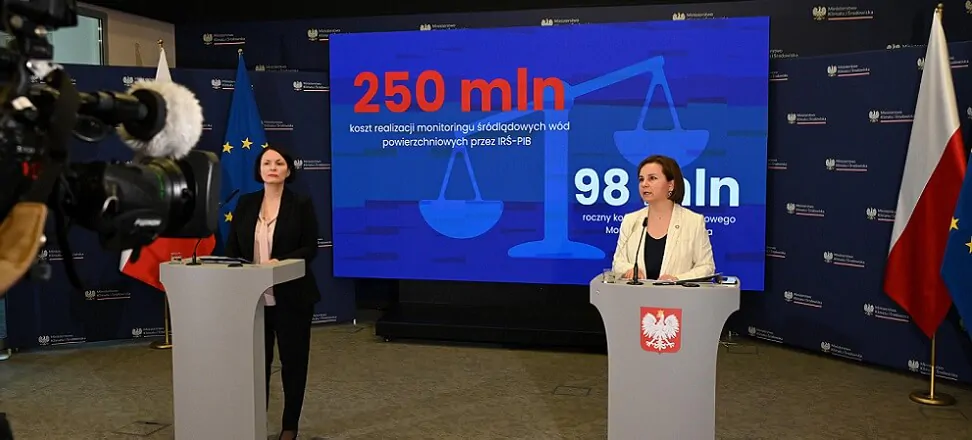Issue 14/2024, News
MIA notifies prosecutor’s office after water monitoring system fiasco
An ecological crisis caused by a golden algae bloom is being fought at the Dzierżno Duże reservoir. Meanwhile, the previous government is being criticized for mismanagement and negligence. A planned surface water monitoring system has failed, prompting the Ministry of Climate and Environment (MoE) to file a notice in early August this year. notice to the Warsaw District Prosecutor’s Office of the possibility that public officials had committed a crime.
Surface water monitoring system – great unrealized plans
The environmental crisis on the Oder River in 2022. proved to be a proverbial bucket of cold water for the administration at the time. The events highlighted the need for a more effective monitoring system for Poland’s surface waters to avoid future disasters such as golden algae blooms. An agreement to this effect was reached on January 3, 2023. Minister of Climate and Environment Anna Moskwa and Minister of Agriculture Henryk Kowalczyk.
As a result, the two ministries, the National Fund for Environmental Protection and Water Management (NFOŚiGW) and the Inland Fisheries Institute – National Research Institute (IRŚ-PIB) signed an agreement on June 5, 2023. an agreement under which the IRŚ-PIB was to establish a new parallel surface water monitoring system with an early warning and disaster response system. The project was allocated PLN 250 million, much more than the annual amount allocated to the State Environmental Monitoring(PLN 98 million).
During a press conference held on August 7 this year. in connection with the filing of a notice to the prosecutor’s office, the current Deputy Minister of Climate and Environmental Protection Urszula Zielińska said that instead of a functioning modern monitoring system, we have an extra-statutory ministerial agreement for 250 million zlotys, which has exposed the State Treasury to the mismanagement of this amount.

What has been done?
The contract, signed in 2023. provided for the establishment of 825 water level measurement points (including 500 mobile ones) on all key rivers in Poland. To this end, an advance payment of PLN 52 million has been made, so far unaccounted for despite the deadline. Minister Zielinska stressed that when she took control of the ministry at the beginning of the year, water pollution and salinity in the Oder was at the same level as in recent years. Of the eight measuring probes promised by the previous ministry on the Oder River at the beginning of the year, not a single one was working.
Nor were the promised satellite techniques or the announced 24-hour pilot monitoring of the Oder River included in the project. What’s more, as Minister Zielińska stressed, the planned surface water monitoring system had no legal basis, strictly defined by the 1991 Environmental Protection Inspection Act.
So far, only 46 of the planned 325 permanent monitoring stations have been built. At the same time, the entire system was to be implemented before the end of 2024. An inspection by the National Environmental Protection and Water Management Fund conducted in April this year. found only a 30 percent achievement of the goals set out in the contract, which also included the creation of relevant reports and an IT system.
The case in the hands of the prosecutor’s office
In the opinion of the IOC, the contract with the IRS-PIB was not only non-statutory, but also failed to sufficiently define the technical and functional requirements of the planned system. Care was not taken to ensure an optimal selection of methods and means, and the continuity of monitoring after the contract ended was not guaranteed. The shape of the IRŚ-PIB’s contract with the National Environmental Protection and Water Management Fund was criticized last year by the Supreme Audit Office, pointing to obvious shortcomings.
In a notice to the prosecutor’s office, the IOC accuses, public officials charged with setting up the surface water monitoring system, of mismanaged spending of Treasury funds, exceeding their authority and failing to fulfill their duties, including in their duty to supervise the National Environmental Protection and Water Management Fund. We are talking about the officers who concluded the aforementioned contracts and supervised the NFOŚiGW last year. According to Minister Zielińska, their actions were inexpedient, wasteful and without legal basis, which falls under Art. 231 of the Criminal Code on acting to the detriment of the public interest.
The IRŚ-PIB also lacks the experience and competence to establish surface water monitoring – according to the IOC, the system should legally be left to the State Environmental Monitoring, and in particular to the Chief Inspector of Environmental Protection, who is responsible for it.
According to NFOŚiGW President Dorota Zawadzka, implementation of the planned monitoring was unlikely to achieve not only the set physical goals, but also the environmental goals. As a result, further implementation of the contract was suspended on April 15. A detailed analysis is currently underway, which may result in the definitive termination of the contract with the IRŚ-PIB.
Photo. main: Alice/Pixabay

 Polski
Polski







